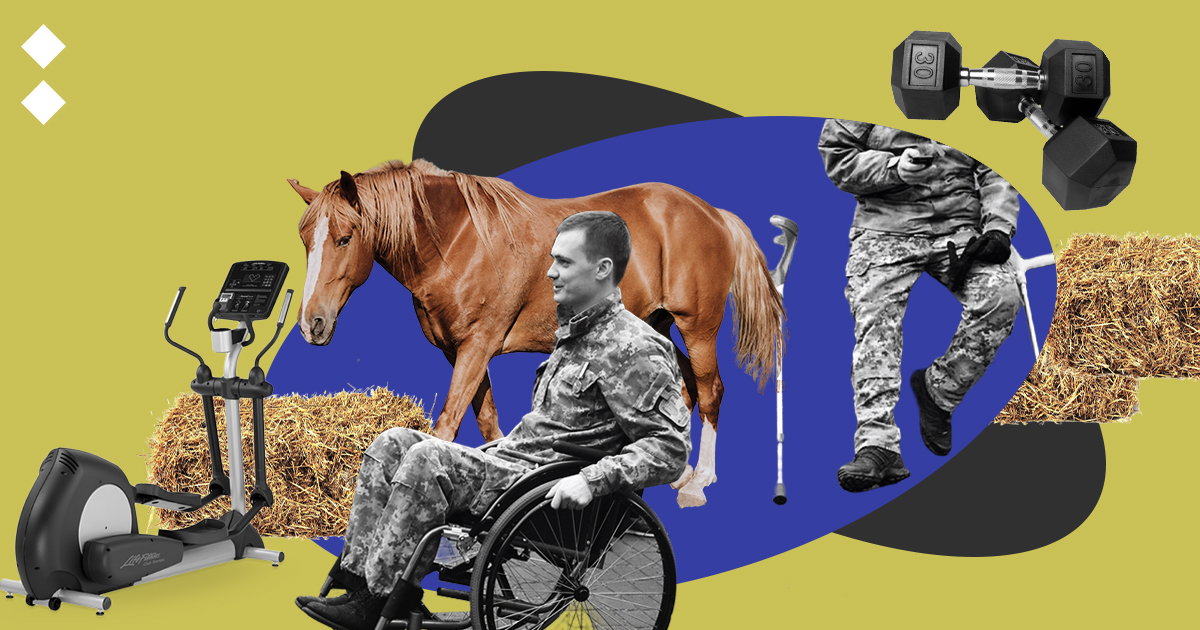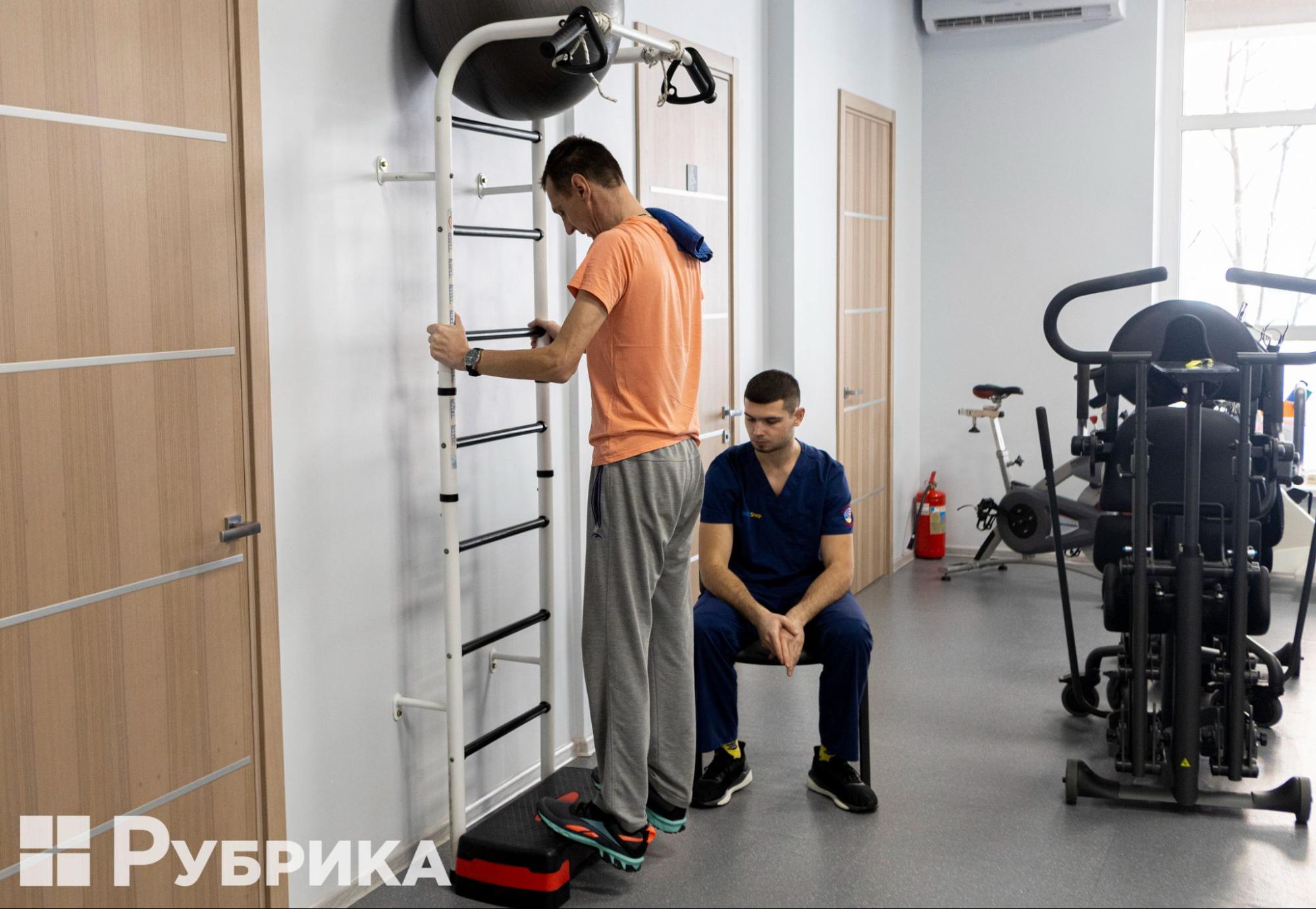In 2022, the NextStep rehabilitation center in the Kyiv region survived the occupation and resumed its work, providing services first to civilians and later to the military. In two years, they were able to help 170 people and are not going to stop. After all, the number of service members who need rehabilitation increases as the full-scale war enters its third year. Rubryka learned what is needed for quality recovery of the military and how riding horses helps cope with trauma.


Ukrainian soldiers return from the front with a wide variety of injuries, which, without prompt and high-quality help, can only get worse over time. Specialists emphasize that the sooner the wounded start working with rehabilitation specialists, the more likely the rehabilitation will have positive results.
Tetyana Hrubenyuk, director of the charity fund Recovery of Defenders of Ukraine and head of the NextStep rehabilitation center, explains that if an ordinary person breaks an arm and does not start seeing a doctor in time, there is every chance that this arm will no longer function properly. The same applies to military injuries.
If a service member is recommended rehabilitation after an injury but doesn't want to or doesn't have the time, they might lose that golden moment. If a wounded person turns to the rehabilitation center after some time, it might be harder to treat their injuries. "Every moment is significant and should not be lost," adds Hrubenyuk.
The quality of rehabilitation is also important and will affect whether the injured person can recover from the injury and learn to cope with it. This includes both the physical and psychological parts of recovery. Often, getting access to one of these components for the military is a challenge.


In the rehabilitation center Next Step.
NextStep Ukraine rehabilitation center offers neurorehabilitation for military personnel, combining physical and psychological rehabilitation. The team started its work back in 2014. At first, the founder, Iryna Vashchuk, sent seriously wounded soldiers for treatment in the USA, and in 2018 and 2023, she opened centers in Irpin and Lviv.
All services for the military are free of charge. In addition to physical rehabilitation, the institution works to improve the morale of fighters and even offers horse riding. Military personnel from all over Ukraine and foreigners who participated in the defense of Ukraine and were wounded come here for rehabilitation.
38-year-old Oleksandr worked for an insurance company before the full-scale invasion and, after, stood up for Ukraine's defense.
He is undergoing rehabilitation after a penetrating battle wound. Oleksandr says that there were no problems with the leg because there are soft tissues, but the situation with the hand is way worse — the median nerve was severed, causing neuropathy.
After that, the commander invited him to visit NextStep. The center is well-known among the military, and the comrades mostly recommend it to the wounded. Here, Oleksandr is undergoing a recovery course for the third week and shares with Rubryka: "I feel a certain discomfort and pain, but because of this, the result appears. I see that I can do more with my injured hand."
The soldier says he will make further plans based on rehabilitation results and the military medical commission conclusion. He wants to return to the service because he has already spent many months with his comrades and misses them. However, if he doesn't fully recover, he doesn't want to disappoint and undermine his comrades' safety.
The prototype for NextStep Ukraine was the American rehabilitation facility NextStep Fitness Los Angeles. The latter's principles inspired the founder of the Ukrainian centers. Today, the team actively maintains contacts with specialists from the USA in military rehabilitation. For example, Ukrainian specialists often undergo training and internships there.
The professionalism of the rehabilitators at the center comes first. Hrubenyuk shares that the rehabilitation center is not a gym. If you want to make a gym for veterans and injured soldiers — there must be a professional approach. You can't just open a facility, throw dumbbells and treadmills there, and call it a rehabilitation center. It needs a professional with an education who understands what to do, wants to improve and learn.
The wounded get rehabilitation in the Ukrainian center, but if the situation is too complex, they can be sent for treatment abroad.
Each case of rehabilitation is individual — for some, it takes a month; for others — three. The center works toward the result, no matter how long it takes. Another principle of the center's work is that rehabilitation is close to the patient's daily activities.
Training at the rehabilitation center.
The center also focuses on the needs arising from the specific realities of war. At the beginning of the full-scale war, the percentage of victims with severe wounds and arm amputations increased due to the widespread post-tourniquet syndrome, which can appear due to the long wait for evacuation. Therefore, the team specially stocked up on equipment specifically for hand rehabilitation — the center purchased various devices for occupational therapy (a set of measures to restore motor functions, — ed.).
In addition to rehabilitation services, the center also provides service members with a place to live in Irpin — a rented house fully adapted to all the potential needs of the wounded, like a lift and barrier-free toilets.
The center offers various activities aimed at the psychological recovery of the wounded, particularly in cooperation with partners. One of them is the Bucha equestrian sports club, thanks to which military personnel have the opportunity to try themselves as riders.
Horseback riding in the rehabilitation center.
Maxym is a marine undergoing rehabilitation due to leg injuries. He says that horses are his favorite memory. Previously, even before the service, he rode horses and loved this activity. Maksym adds that military personnel who come here for rehabilitation are often happy to ride horses. Military personnel take photos with animals, feed and stroke them, and tactile contact helps relax and distract them.
Marta Romanyshyn has been working as a physical therapist since 2012. The specialist explains that currently riding horses in the center cannot be called hippotherapy (rehabilitation with the participation of horses, — ed.), but such activity has its psychological effect.
The physiotherapist says that horse riding is often prescribed to people with severe spasticity (a condition in which a person's muscles twitch — ed.) since a horse's body temperature is much higher than a human's. At the same time, she emphasizes the rules — first of all, riding must be safe.
Horseback riding in the rehabilitation center.
If patients have cognitive or motor impairments and there is a certain risk, riding is unsafe.
Rostyslav is one of those who likes horse riding and is not against it. He had been in the war zone since 2016, having been wounded at the beginning of the full-scale invasion while serving in Mariupol — shrapnel hit the spinal cord. He was able to receive help only in June 2022, when he was exchanged from captivity. Since then, for some time, the soldier could move only in a wheelchair. Rostyslav has been undergoing rehabilitation at the center for two years. Now, he can walk on crutches, and in good weather, he can walk up to 300 meters by himself.
Horseback riding in the rehabilitation center.
Military personnel do not need to bring files of their documents or prove anything. Just give us a call or write on the website and fill out the questionnaire — to indicate that you need rehabilitation," says Hrubenyuk.
The center's team only needs a discharge letter so that the rehabilitation specialists can see what the injuries are, what the interventions were, what the situation is now, and what needs to be worked on. Having this information, the center can already appoint a military consultation.
The director of NextStep adds that rehabilitation is serious work, and the soldiers who go through it must make great efforts to achieve the result: "They know exactly why they are doing it; they set goals for themselves, and they go for them. Someone learned to write anew, and someone learned to assemble figures, stand up, walk, and so on. We witness incredible and tireless daily efforts of individuals who have undergone harrowing experiences but continue to persevere."
39 років тому аварія на Чорнобильській АЕС призвела до відселення людей із територій, забруднених радіоактивними… Читати більше
Recovery Camp is a psychosocial rehabilitation project for Ukrainian children that has been running for… Читати більше
Екологічна освіта, громадянська наука та цікава практика — складники ініціативи, яку втілили для молоді Краснокутської… Читати більше
A team of researchers has trained an AI model to see not just rubble in… Читати більше
У лікарнях Харкова та Ужгорода студенти під наставництвом психологинь, менторів та супервізора проводять для дітей… Читати більше
У Лубнах фахівці, які допомагають військовим, вчилися будувати довірливий контакт із тваринами, зокрема кіньми та… Читати більше
Цей сайт використовує Cookies.